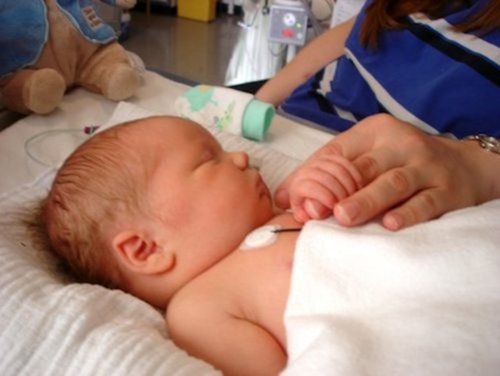Thursday, 26 July 2012
Mother’s Hug Brought Newborn Out of Coma
It's a parent's worst nightmare. Baby Adam was born a healthy 7 lbs 3 oz, but the next day he began to have violent seizures. "His entire body started to shut down," his mother Charlotte Cheshire tells the Telegraph UK. "He was blue and shaking with convulsions." Soon, the newborn slipped into a coma. Doctors advised his parents to say goodbye, but now, a little more than year later, he's taking his first steps.
Baby Adam had contracted meningitis caused by Group B streptococcal septicemia (GBS), a disease that often goes undetected in pregnant women and can be passed to newborns during labor or delivery. If babies survive the infection, they can be left with serious disabilities including vision and hearing loss and cerebral palsy.
Doctors prepared the family for the worst and a midwife said they should take final photographs. While their child struggled on life support, Charlotte Cheshire and her husband Chris were only able to stroke his arm or leg. "I'll never forget how I felt looking into that incubator for the first time," recalls mom. "He had more wires attached to his tiny body than I have ever seen."
Charlotte and Adam todayFinally, a week after he was born, mom was allowed to hold him close against her skin. The baby blinked eyes open for the first time since becoming sick. "The moment he opened his eyes was incredible," says mom. "I knew that if he was waking up, he would survive." Adds dad, "Adam is our miracle. He just refused to give up."
Despite having suffered a full pelvic split during labor (where the bones of the pelvis separate) and being in great pain herself, for the next three days, Charlotte Cheshire sat holding Adam in her arms for 12 hours a day. "Kangaroo care," or close skin-to-skin contact with a parent, can help regulate babies' breathing and temperature. There have been other documented cases in which a seemingly lifeless baby has been revived by a mother's embrace. After three weeks in the neonatal unit, an MRI showed that Adam's brain injury had healed and he was allowed to go home.
An estimated 25% of women carry GBS and about 8,000 babies a year in the United States contract the disease. The Centers for Disease Control recommends that all pregnant women get a simple swab test between 35 and 37 weeks. If they are carriers, antibiotics administered during labor will stop the infection from being passed to their baby. "By sharing my story," says Cheshire, "I hope more women know about GBS and can therefore prevent going through experiences like ours."
Subscribe to:
Post Comments (Atom)


No comments:
Post a Comment